News
Passengers hold their noses at racist, incompetent railway
 Sri Lanka Railways, which boasts that it aspires ‘to be the most efficient transport provider of South Asia’, insists it will continue the racially discriminatory initiative of providing separate, clean toilets for foreign commuters at rail stations, while bemoaning that it has no money to provide hygienic sanitary facilities for Sri Lankans.
Sri Lanka Railways, which boasts that it aspires ‘to be the most efficient transport provider of South Asia’, insists it will continue the racially discriminatory initiative of providing separate, clean toilets for foreign commuters at rail stations, while bemoaning that it has no money to provide hygienic sanitary facilities for Sri Lankans.
Transport Minister Nimal Siripala de Silva avoided comment, despite more than 20 telephone calls and messages left with his staff members.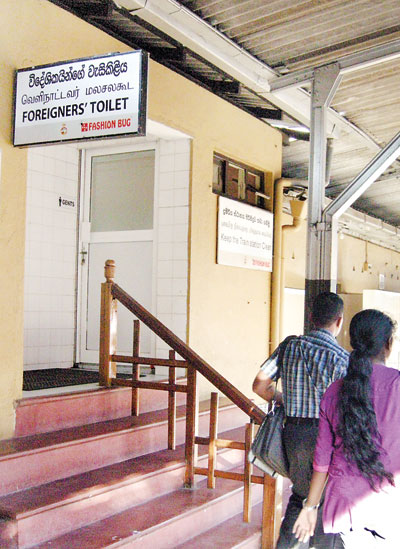
In 2015 the Sri Lanka Railway Department generated passenger revenue of more than Rs 5 billion. Passenger revenue is its cash cow. Total revenue exceeded Rs 6.3 billion in 2015. Its expenditure that year was more than Rs 44.5 billion. The operating losses came in at Rs 7.7 billion.
Despite the losses and the often-heard excuse of lack of money to develop the railway, personal emoluments to staff increased by Rs 1.92 billion to Rs 8.1 billion in 2015. Personal emoluments are by far the biggest cost, accounting for 58 percent of recurrent expenditure. Trains operate on time only 39 percent of the time, its own data show.
The heavily inefficient, overstaffed (15,205 employees, plus 17,496 others including contract staff), and loss-making Sri Lanka Railway offers relatively well-kept toilets to foreign visitors, while continuing to maintain nauseatingly filthy sanitary facilities for its local travellers who are its bread and butter.
In the facilities meant for locals, graffiti deface the walls, the taps are broken and the toilets are clogged.
In addition to existing toilets for ‘foreigners only’ at Colombo Fort, Mt Lavinia, Badulla, Hikkaduwa, and Panadura, there are proposals to build more such facilities at other stations.
Officials of the Transport Ministry, railway, and station masters, are defending the idea. They say foreigners use dry toilets and that locals are damaging the sanitary facilities.
But, foreign visitors themselves are surprised.
Polish national, Piotr Michel Kuziar, who was at Colombo Fort Railway station: “This is weird, I even felt awkward when I needed to use the wash room because I needed to ask the station master, I don’t know why they keep it locked.”
He said toilets for locals were unbearably smelly and were wet and soggy.
“It is surprising to see heads of the railway neglecting sanitary facilities for locals,” Kuziar said. “We get to use clean toilets. Locals and foreigners pay for their tickets. I think neglecting the people of the state is very bad as well as discriminating.”
Locals are not pleased.
Sanjeewa Perera, a supervisor at a construction site, said: “There are yellow stains in the urinals. There are even beer cans littering the wash rooms.’’ Fixtures and fittings in the toilets for locals are left unrepaired.
Another commuter, Sumudu Silva, said the women’s wash rooms are smelly and badly illuminated. She said some areas of the wash room are wet, while sanitary towels are piled high on a bin at the entrance.
She expressed disgust that hard working government employees are treated so badly when it comes to sanitary facilities.
Senarath Perera, a lawyer, and who is also a regular rail commuter, said the bad odour prevented him from using the wash rooms He said it was unfair to provide foreigners with well-maintained toilets and that the sanitary needs of the people of the country are overlooked.
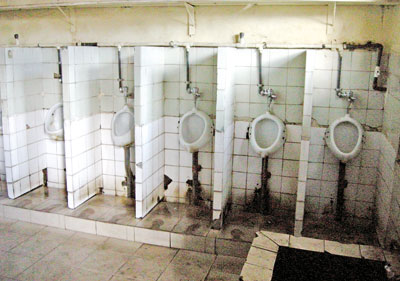
The toilets for locals at the Maradana station (above) and the toilets under lock and key for foreigners at the Fort station (left, above)
He suggests providing facilities based on prices that travellers pay. The railways could offer wash rooms and rest rooms for first, second, and third class passengers and charge them accordingly.
Retired railway officials said that in the past, facilities were provided based on the ticket price and not according to nationality.
Transport Ministry Secretary, Nihal Somaweera, said there were no funds to upgrade facilities. “We have planned to develop foreign tourist toilets first due to the demand from station masters as well as the Tourism Ministry.” He said the Tourism Ministry was funding the projects.
“Foreign travellers bring revenue,’’ he said noting that Sri Lanka needs to maintain better services for them. “They pay well, too, so they need to be treated well, ” he said.
Somaweera explained that that ministry was aware of the appalling condition of toilets for locals, but that when these sanitary facilities are renovated, they are then destroyed by callous Sri Lankans.
“We have plans to improve public toilets by fitting easily cleanable urinals and toilets which are equipped with automatic flushing mechanisms but that project is delayed due to lack of funds,” he said.
General Manager of Railway, B A P Ariyaratne, said he was unavailable for comment and wanted the Deputy Operations Superintendent, V S Polwattage, to respond.
Polwattage said the railway was not favouring foreigners, but was providing better facilities to attract visitors. “There is nothing wrong with foreigners and locals using the same bathrooms, but the locals use the toilets in a way that makes the place soggy and wet,’’ he said adding that locals damage the fittings and fixtures.
He also said there are not enough sanitary workers to help maintain the toilets for Sri Lankans.
A cross section of station masters island-wide defended the move to provide separate toilets for foreigners on the grounds that public toilets cannot be maintained properly.
More stations also have requested separate toilets for foreign visitors. Among them is the Ella railway station. Ella is a popular tourist destination.
However, the Sunday Times learns that the railways had failed to recruit sanitary workers.
A senior official of the department said most workers recruited recently had G.C.E. (O/L) qualifications and were refusing to clean toilets.
A batch of female employees reportedly recruited by the former the government on political directives had been initially deployed to collect tickets, but then they have been transferred to the Ratmalana railway yard. “They are being paid Rs 25,000 a month for not working,” the official added.
Rail commuters said that if the railway was unable to maintain the toilets they could contract private companies.
Lawyer Perera said the Railway Ordinance allows action against persons who damage railway property and the department should not offer excuses. “They can charge them for damaging public property and take serious action.”
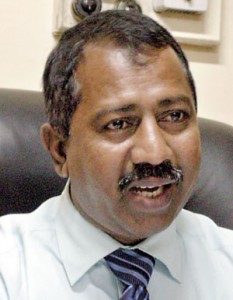
Deputy Operating Superintendent, V S Polwattage
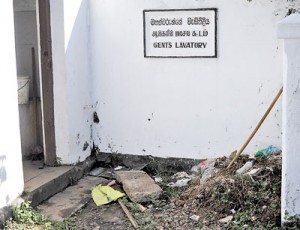
Mount Lavinia station: The picture says it all
| RAIL TOURISM CREATES NEED FOR MORE TOILETSThe Tourism Ministry is planning more toilets for foreign visitors to develop railway tourism, a senior Ministry official said.The Secretary to the Ministry of Tourism, P H J B Sugathadasa, told the Sunday Times that they were in the process of developing railway stations at locations where there are tourist attractions. “To attract more tourists, we are assisting the railway on renovations of stations such as Nanu oya, Ella and a few other upcountry railway stations.’’ |
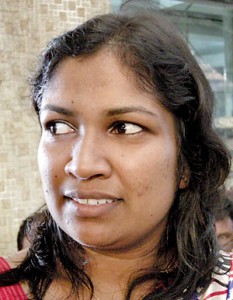
Sumudu Silva
| MINISTER SUGGESTS PRICE-BASED RAIL SERVICESMinister of Cultural Affairs, S.B. Navinna, said that Sri Lanka’s culture of hospitality may have influenced how foreign guests are treated.“According to Sri Lankan culture, normally the guest is welcomed with open arms and is provided the best facilities. This cannot be seen as treating the locals differently,’’ he said. He said, however, the colonial mindset ought to change. He also said foreign visitors who pay more should be provided with better services. He suggests services based on prices paid by travellers for different carriage classes. “If locals are paying for first or second class tickets they too should be provided with the same facilities given to the foreign commuters.’’ |
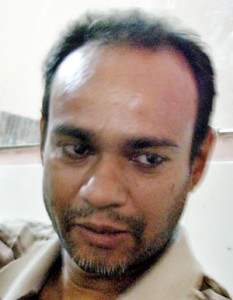
Sanjeewa Perera

Piotr Michel Kuziar

